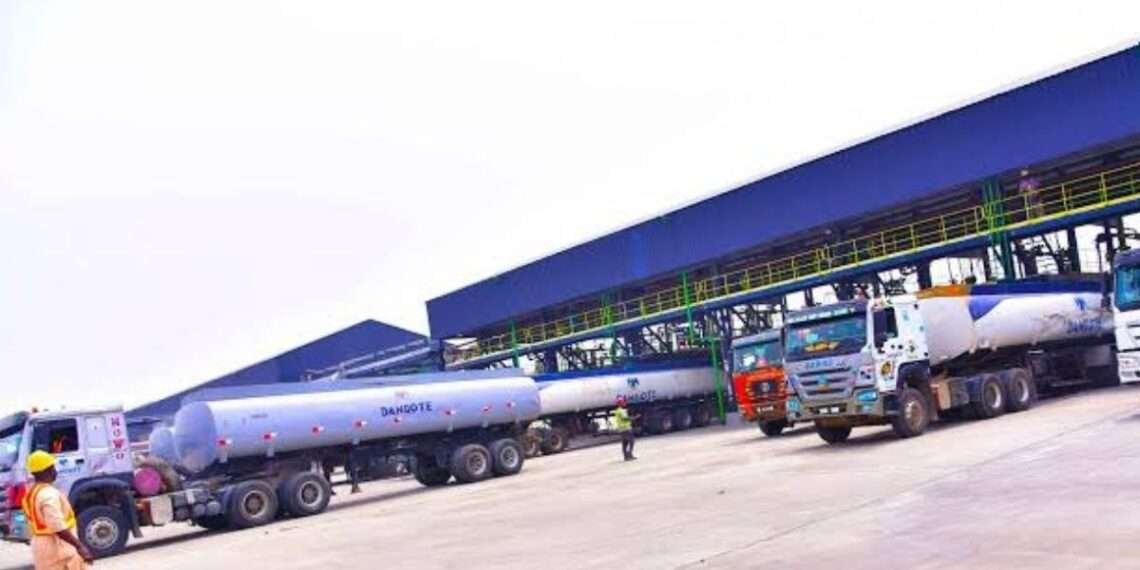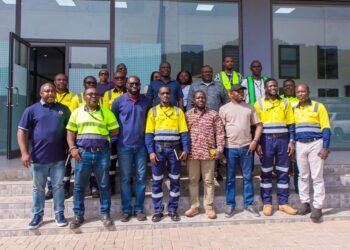The Dangote Refinery has announced the export of Premium Motor Spirit (PMS), commonly known as petrol, to four African countries: Cameroon, Angola, Ghana, and South Africa.
This milestone achievement underscores the refinery’s role in enhancing Africa’s energy security while also establishing its presence in international markets. The Vice President of Oil and Gas at Dangote Industries, Devakumar Edwin, confirmed this development during a visit from the Japanese Business Community in Nigeria, led by Japan’s Ambassador-designate to Nigeria, Suzuki Hideo.
“In recent weeks, we’ve exported petrol to Cameroon, Ghana, Angola, and South Africa among others.
“Diesel has gone all over the world, and jet fuel is being heavily exported to European markets. Our products are already making their mark internationally.”
Devakumar Edwin, Vice President of Oil and Gas at Dangote Industries
The refinery, a project conceived by Nigerian billionaire Aliko Dangote, is a testament to Nigeria’s capacity to deliver world-class infrastructure.
Edwin emphasized that the facility is a product of Nigerian ingenuity, designed and built by Nigerians to serve both domestic and international markets.
During the visit, Edwin also expressed interest in deepening collaboration with Japanese businesses, particularly in the areas of technological innovation and investment.
“Even now, we have a lot of Japanese equipment inside both the refinery and the fertiliser plant.
“There are significant opportunities for collaboration, as we always seek the latest technology in any business, we engage in.”
Devakumar Edwin, Vice President of Oil and Gas at Dangote Industries
He pointed out that the company has consistently embraced advanced technology in its operations, citing the example of their cement plant laboratory, which is fully managed by robots.
Edwin invited Japanese firms to explore opportunities for supplying cutting-edge technologies to enhance the company’s operations further.
The Dangote Refinery has rapidly established itself as a key player in the global energy market, achieving early success in exporting petroleum products to diverse markets.
These exports mark a critical step in diversifying Nigeria’s economy, reducing its dependence on crude oil exports, and curbing foreign exchange outflows associated with importing refined petroleum products.
The Vice President highlighted the broader economic impact of the refinery and its associated projects, such as the Dangote Petrochemical complex.
“The Dangote Petrochemical project will significantly boost investment in downstream industries, generate employment, increase tax revenues, reduce foreign exchange outflows, and contribute to Nigeria’s Gross Domestic Product (GDP),” Edwin stated.
Japanese Delegation Praises the Refinery’s Technological Prowess

The Japanese delegation, led by Suzuki Hideo, was visibly impressed by the refinery’s scale and technological sophistication. Commending the project, Hideo described it as a “wonder of modern technology.”
According to the statement released by Dangote Industries, Hideo acknowledged the remarkable achievement of a Nigerian company in designing and constructing such a state-of-the-art facility, which now holds the title of the world’s largest single-train refinery.
“This refinery is a point of pride for Nigeria and Africa at large,” Hideo remarked. The Ambassador-designate further noted that the success of the Dangote Refinery serves as a beacon of hope for technological and industrial development across the continent.
The export of petrol to African countries such as Cameroon, Ghana, Angola, and South Africa represents a pivotal moment for energy independence within the continent.
Historically, many African nations have relied on importing refined petroleum products from outside the continent, often incurring high costs.
The Dangote Refinery’s ability to supply high-quality products locally and regionally has the potential to reduce this dependence, strengthen intra-African trade, and enhance energy security across the region.
By prioritizing exports to neighboring African nations, the refinery not only supports regional economies but also aligns with broader initiatives like the African Continental Free Trade Area (AfCFTA), which aims to promote trade among African countries.
This achievement not only enhances Nigeria’s stature on the global stage but also serves as a source of inspiration for other African nations to invest in transformative infrastructure projects.
READ ALSO: Congo Crackdown, Amnesty Calls for Justice Investigation























